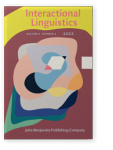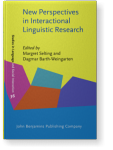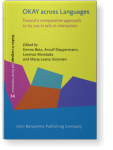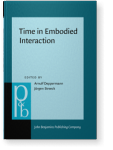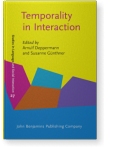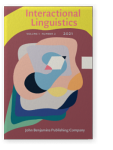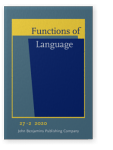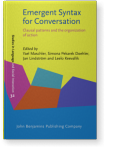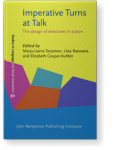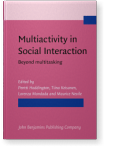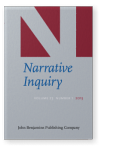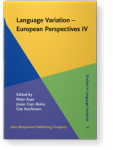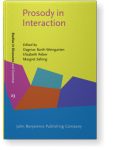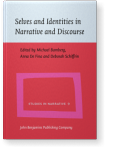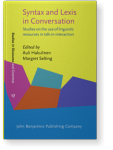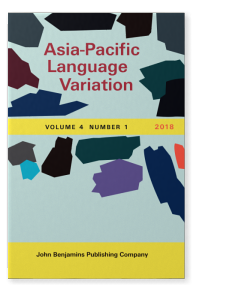Arnulf Deppermann
List of John Benjamins publications for which Arnulf Deppermann plays a role.
Journals
Book series
Titles
OKAY across Languages: Toward a comparative approach to its use in talk-in-interaction
Edited by Emma Betz, Arnulf Deppermann, Lorenza Mondada and Marja-Leena Sorjonen
[Studies in Language and Social Interaction, 34] 2021. vii, 440 pp.
Subjects Discourse studies | Pragmatics | Semantics | Syntax | Theoretical linguistics
Time in Embodied Interaction: Synchronicity and sequentiality of multimodal resources
Edited by Arnulf Deppermann and Jürgen Streeck
[Pragmatics & Beyond New Series, 293] 2018. vi, 354 pp.
Subjects Communication Studies | Discourse studies | Gesture Studies | Pragmatics
Temporality in Interaction
Edited by Arnulf Deppermann and Susanne Günthner
[Studies in Language and Social Interaction, 27] 2015. vi, 342 pp.
Subjects Pragmatics | Semantics | Syntax | Theoretical linguistics
Articles
2024 Meta-semantic practices in social interaction: Definitions and specifications provided in response to Was heißt X (‘what does X mean’) Interactional Linguistics: Online-First Articles | Article
In social interaction, different kinds of word-meaning can become problematic for participants. This study analyzes two meta-semantic practices, definitions and specifications, which are used in response to clarification requests in German implemented by the format Was heißt X (‘What does X… read more
2024 What do you understand by X? Semantics in interactional linguistics New Perspectives in Interactional Linguistic Research, Selting, Margret and Dagmar Barth-Weingarten (eds.), pp. 103–130 | Chapter
This chapter discusses major developments in the field of Interactional Semantics. After locating Interactional Semantics within the study of semantics and introducing major contributions to the field, two approaches for studying semantics in interaction are exemplified: The study of… read more
2024 Meaning in interaction: Meaning in interaction Interactional Linguistics: Online-First Articles | Introduction
This editorial to the Special Issue on “Meaning in Interaction” introduces to the approach of Interactional Semantics, which has been developed over the last years within the framework of Interactional Linguistics. It discusses how “meaning” is understood and approached in this framework and… read more
2021 Chapter 3. OKAY in responding and claiming understanding OKAY across Languages: Toward a comparative approach to its use in talk-in-interaction, Betz, Emma, Arnulf Deppermann, Lorenza Mondada and Marja-Leena Sorjonen (eds.), pp. 56–92 | Chapter
OKAY originates from English, but it is increasingly used across languages. This chapter presents data from 13 languages, illustrating the spectrum of possible uses of OKAY in responding and claiming understanding in contexts of informings. Drawing on a wide range of interaction types from both… read more
2021 Positionally-sensitive action-ascription: Uses of Kannst du X? ‘Can you X?’ in their sequential and multimodal context Interactional Linguistics 1:2, pp. 183–215 | Article
Schegloff (1996) has argued that grammars are “positionally-sensitive”, implying that the situated use and understanding of linguistic formats depends on their sequential position. Analyzing the German format Kannst du X? (corresponding to English Can you X?) based on 82 instances from a large… read more
2021 Chapter 2. Data and methods used in the study of OKAY across languages OKAY across Languages: Toward a comparative approach to its use in talk-in-interaction, Betz, Emma, Arnulf Deppermann, Lorenza Mondada and Marja-Leena Sorjonen (eds.), pp. 30–51 | Chapter
In this chapter, we overview the specificity of comparisons made within the perspective of Conversation Analysis (CA), and we position them in relation to other fields. We introduce the analytical mentality, methodology, and procedures of CA, and we show how we used it for the analysis of OKAY in… read more
2021 Chapter 12. Coordination of OKAY, nods, and gaze in claiming understanding and closing topics OKAY across Languages: Toward a comparative approach to its use in talk-in-interaction, Betz, Emma, Arnulf Deppermann, Lorenza Mondada and Marja-Leena Sorjonen (eds.), pp. 363–393 | Chapter
Our paper examines how bodily behavior contributes to the local meaning of OKAY. We explore the interplay between OKAY as response to informings and narratives and accompanying multimodal resources in German multi-party interaction. Based on informal and institutional conversations, we describe… read more
2020 Practices of indexing discrepant assumptions with German ich dachte (‘I thought’) in talk-in-interaction Functions of Language 27:2, pp. 113–142 | Article
This paper studies practices of indexing discrepant assumptions accomplished by turn-constructional units with ich dachte (‘I thought’) in German talk-in-interaction. Building on the analysis of 141 instances from the corpus FOLK, we identify three sequential environments in which ich dachte is… read more
2020 Chapter 10. Right-dislocated complement clauses in German talk-in-interaction: (Re-)specifying propositional referents of the demonstrative pronoun das Emergent Syntax for Conversation: Clausal patterns and the organization of action, Maschler, Yael, Simona Pekarek Doehler, Jan Lindström and Leelo Keevallik (eds.), pp. 275–302 | Chapter
This contribution deals with right-dislocated complement clauses with the subordinating conjunction dass (‘that’) in German talk-in-interaction. The bi-clausal construction we analyze is as follows: The first clause, in which one argument is realized by the demonstrative pronoun das (‘this/that’),… read more
2018 Chapter 9. Changes in turn-design over interactional histories – the case of instructions in driving school lessons Time in Embodied Interaction: Synchronicity and sequentiality of multimodal resources, Deppermann, Arnulf and Jürgen Streeck (eds.), pp. 293–324 | Chapter
This paper studies how the turn-design of a highly recurrent type of action changes over time. Based on a corpus of video-recordings of German driving lessons, we consider one type of instructions and analyze how the same instructional action is produced by the same speaker (the instructor) for the… read more
2018 The body in interaction: Its multiple modalities and temporalities Time in Embodied Interaction: Synchronicity and sequentiality of multimodal resources, Deppermann, Arnulf and Jürgen Streeck (eds.), pp. 1–30 | Chapter
2017 Chapter 2. A cline of visible commitment in the situated design of imperative turns: Evidence from German and Polish Imperative Turns at Talk: The design of directives in action, Sorjonen, Marja-Leena, Liisa Raevaara and Elizabeth Couper-Kuhlen (eds.), pp. 27–63 | Chapter
In the management of cooperation, the fit of a requested action with what the addressee is presently doing is a pervasively relevant consideration. We present evidence that imperative turns are adapted to, and reflexively create, contexts in which the other person is committed to the course of… read more
2015 Retrospection and Understanding in Interaction Temporality in Interaction, Deppermann, Arnulf and Susanne Günthner (eds.), pp. 57–94 | Article
This paper shows how understanding in interaction is informed by temporality, and in particular, by the workings of retrospection. Understanding is a temporally extended, sequentially organized process. Temporality, namely, the sequential relationship of turn positions, equips participants with… read more
2015 Introduction: Temporality in interaction Temporality in Interaction, Deppermann, Arnulf and Susanne Günthner (eds.), pp. 1–24 | Article
The authors establish a phenomenological perspective on the temporal constitution of experience and action. Retrospection and projection (i.e. backward as well as forward orientation of everyday action), sequentiality and the sequential organization of activities as well as simultaneity (i.e.… read more
2014 Multimodal participation in simultaneous joint projects: Interpersonal and intrapersonal coordination in paramedic emergency drills Multiactivity in Social Interaction: Beyond multitasking, Haddington, Pentti, Tiina Keisanen, Lorenza Mondada and Maurice Nevile (eds.), pp. 247–282 | Article
This paper analyses paramedic emergency interaction as multi-modal multi-activity. Based on a corpus of video-recordings of emergency drills performed by professional paramedics during advanced training, the focus is on paramedics’ participation in multiple joint projects which become… read more
2013 How to get a grip on identities-in-interaction: (What) Does ‘Positioning’ offer more than ‘Membership Categorization’? Evidence from a mock story Narrative Inquiry 23:1, pp. 62–88 | Article
This article advocates an understanding of ‘positioning’ as a key to the analysis of identities in interaction within the methodological framework of conversation analysis. Building on research by Bamberg, Georgakopoulou and others, a performative, interaction-based approach to positioning is… read more
2013 Editorial: Positioning in narrative interaction Narrative Inquiry 23:1, pp. 1–15 | Article
2013 ‘Standard usage’: Towards a realistic conception of spoken standard German Language Variation - European Perspectives IV: Selected papers from the Sixth International Conference on Language Variation in Europe (ICLaVE 6), Freiburg, June 2011, Auer, Peter, Javier Caro Reina and Göz Kaufmann (eds.), pp. 83–116 | Article
‘Standard language’ is a contested concept, ideologically, empirically and theoretically. This is particularly true for a language such as German, where the standardization of the spoken language was based on the written standard and was established with respect to a communicative situation, i.e.… read more
2010 Future prospects of research on prosody: The need for publicly available corpora: Comments on Margret Selting “Prosody in interaction: State of the art” Prosody in Interaction, Barth-Weingarten, Dagmar, Elisabeth Reber and Margret Selting (eds.), pp. 41–48 | Article
2007 Using the other for oneself: Conversational practices of representing out-group members among adolescents Selves and Identities in Narrative and Discourse, Bamberg, Michael, Anna De Fina and Deborah Schiffrin (eds.), pp. 273–301 | Article
2005 Conversational interpretation of lexical items and conversational contrasting Syntax and Lexis in Conversation: Studies on the use of linguistic resources in talk-in-interaction, Hakulinen, Auli and Margret Selting (eds.), pp. 289–317 | Article
2000 Narrative Identity Empiricized: A Dialogical and Positioning Approach to Autobiographical Research Interviews Narrative Identity, Bamberg, Michael and Allyssa McCabe, pp. 199–222 | Article
Narrative identity has achieved a scientific status as an elaborate concept of the storied nature of human experience and personal identity. Yet, many questions remain as to its empirical substrate. By exploring the pragmatic aspect of narrative research interviewing, i.e., the performative and… read more
